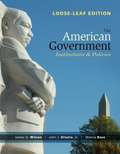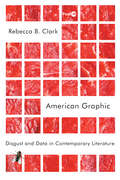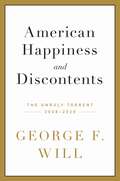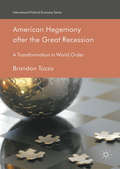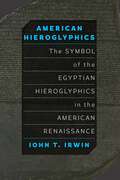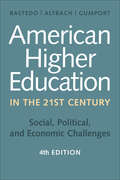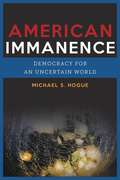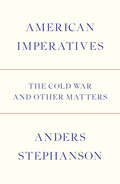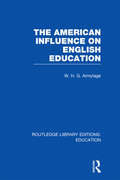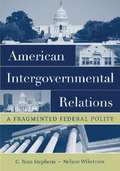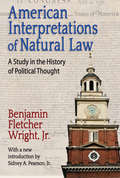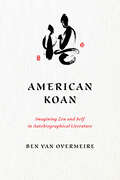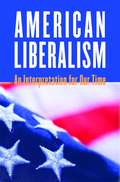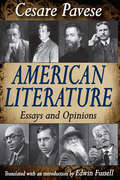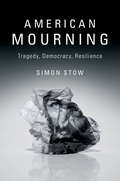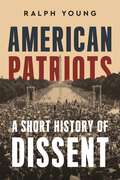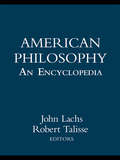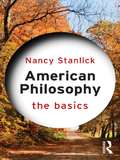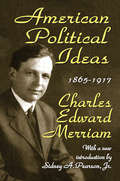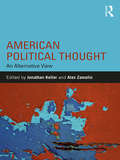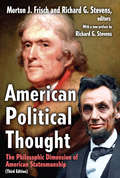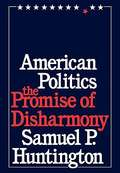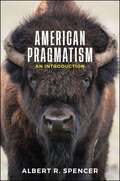- Table View
- List View
American Government: Institutions And Policies
by James Q. Wilson John J. Diiulio Meena BoseAcclaimed for the scholarship of its prominent authors and the clarity of its narrative, AMERICAN GOVERNMENT: INSTITUTIONS AND POLICIES sets the standard for public policy coverage while maintaining focus on three fundamental topics: the institutions of American government; the historical development of governmental procedures, actors, and policies; and who governs in the United States and to what ends. Reader involvement in the material is bolstered by features such as learning objectives, Constitutional Connections relating current issues to founding principles, and How Things Work boxes that illustrate important concepts. Available separately, a state-of-the-art media package with online tools makes the learning experience engaging and accessible.
American Graphic: Disgust and Data in Contemporary Literature (Post*45)
by Rebecca B. ClarkWhat do we really mean when we call something "graphic"? In American Graphic, Rebecca Clark examines the "graphic" as a term tellingly at odds with itself. On the one hand, it seems to evoke the grotesque; on the other hand, it promises the geometrically streamlined in the form of graphs, diagrams, and user interfaces. Clark's innovation is to ask what happens when the same moment in a work of literature is graphic in both ways at once. Her answer suggests the graphic turn in contemporary literature is intimately implicated in the fraught dynamics of identification. As Clark reveals, this double graphic indexes the unseemliness of a lust—in our current culture of information—for cool epistemological mastery over the bodies of others. Clark analyzes the contemporary graphic along three specific axes: the ethnographic, the pornographic, and the infographic. In each chapter, Clark's explication of the double graphic reads a canonical author against literary, visual and/or performance works by Black and/or female creators. Pairing works by Edgar Allan Poe, Vladimir Nabokov, and Thomas Pynchon with pieces by Mat Johnson, Kara Walker, Fran Ross, Narcissister, and Teju Cole, Clark tests the effects and affects of the double graphic across racialized and gendered axes of differences. American Graphic forces us to face how closely and uncomfortably yoked together disgust and data have become in our increasingly graph-ick world.
American Happiness and Discontents: The Unruly Torrent, 2008-2020
by George F. WillExamine the ways in which expertise, reason, and manners are continually under attack in our institutions, courts, political arenas, and social venues with this collection from the Pulitzer Prize-winning conservative columnist. George F. Will has been one of this country&’s leading columnists since 1974. He won the Pulitzer Prize for it in 1977. The Wall Street Journal once called him &“perhaps the most powerful journalist in America.&” In this new collection, he examines a remarkably unsettling thirteen years in our nation&’s experience, from 2008 to 2020. Included are a number of columns about court cases, mostly from the Supreme Court, that illuminate why the composition of the federal judiciary has become such a contentious subject. Other topics addressed include the American Revolutionary War, historical figures from Frederick Douglass to JFK, as well as a scathing assessment of how State of the Union Addresses are delivered in the modern day. Mr. Will also offers his perspective on American socialists, anti-capitalist conservatives, drug policy, the criminal justice system, climatology, the Coronavirus, the First Amendment, parenting, meritocracy and education, China, fascism, authoritarianism, Frank Sinatra, Bob Dylan, The Beach Boys, and the morality of enjoying football. American Happiness and Discontents: The Unruly Torrent, 2008-2020 is a collection packed with wisdom and leavened by humor from one the preeminent columnists and intellectuals of our time.
American Hegemony after the Great Recession: A Transformation in World Order (International Political Economy Series)
by Brandon TozzoThis book traces America's rise as a hegemon of the capitalist system, arguing that the greatest threat to global economic stability is America's polarized and ineffectual political system rather than foreign competition from China and the European Union. The author points to China's considerable demographic problem, which will likely undermine its economic potential. Furthermore, the sovereign debt crisis in Europe - which has left the continent politically fragmented by an institutional malaise - is evidence of the United States' continued status as the world's most successful nation. Tozzo posits that, due to factors such as its initial response to the financial crisis, the near failure of its banking system, the catastrophe of the debt ceiling crisis, and the election of Donald Trump as president, the greatest threat to American hegemony is America itself.
American Hieroglyphics: The Symbol of the Egyptian Hieroglyphics in the American Renaissance
by John T. IrwinA sophisticated examination of the American Symbolists, back in print for the first time in more than a decade.The discovery of the Rosetta Stone and the subsequent decipherment of Egyptian hieroglyphics captured the imaginations of nineteenth-century American writers and provided a focal point for their speculations on the relationships between sign, symbol, language, and meaning. Through fresh readings of classic works by Emerson, Thoreau, Whitman, Poe, Hawthorne, and Melville, John T. Irwin’s American Hieroglyphics examines the symbolic mode associated with the pictographs. Irwin demonstrates how American Symbolist literature of the period was motivated by what he calls "hieroglyphic doubling," the use of pictographic expression as a medium of both expression and interpretation. Along the way, he touches upon a wide range of topics that fascinated people of the day, including the journey to the source of the Nile and ideas about the origin of language.
American Higher Education in the Twenty-First Century: Social, Political, and Economic Challenges
by Michael N. Bastedo, Philip G. Altbach, and Patricia J. GumportAn indispensable reference that everyone concerned with the future of American colleges and universities should acquire.First published in 1999, American Higher Education in the Twenty-First Century offered a comprehensive introduction to the central issues facing American colleges and universities. This thoroughly revised edition brings the classic volume up to date. The contributors have rewritten every chapter to address major changes in higher education, including the rise of organized social movements, the problem of income inequality and stratification, and the growth of for-profit and distance education. Three new chapters cover information technology, community colleges, and teaching and learning.This edition seeks to capture several crucial dynamics in the nexus of higher education and society. Placing higher education within its social and political contexts, the contributors discuss finance, federal and state governance, faculty, students, curriculum, and academic leadership. They also grapple with growing concerns about the future of the academy and reflect more deeply on the racial, ethnic, and socioeconomic diversity within higher education.No other book covers such wide-ranging issues under the broader theme of higher education’s relationship to society. Highly acclaimed and incorporating cutting-edge research, American Higher Education in the Twenty-First Century is now more useful and engaging than ever.Contributors: Michael N. Bastedo, Philip G. Altbach, Patricia J. Gumport, Benjamin Baez, Peter Riley Bahr, Joy Blanchard, Corbin M. Campbell, Melanie E. Corrigan, Peter D. Eckel, Roger L. Geiger, Lawrence E. Gladieux, Sara Goldrick-Rab, Jillian Leigh Gross, D. Bruce Johnstone, Adrianna Kezar, Jacqueline E. King, Aims C. McGuinness, Jr., Michael Mumper, Anna Neumann, Robert M. O’Neil, Laura W. Perna, Gary Rhoades, Roman Ruiz, Lauren Schudde, Sheila Slaughter, Daryl G. Smith
American Immanence: Democracy for an Uncertain World (Insurrections: Critical Studies in Religion, Politics, and Culture)
by Michael S. HogueThe Anthropocene marks the age of significant human impact on the Earth’s ecosystems, dramatically underscoring the reality that human life is not separate from nature but an integral part of it. Culturally, ecologically, and socially destructive practices such as resource extraction have led to this moment of peril. These practices, however, implicate more than industrial and economic systems: they are built into the political theology of American exceptionalism, compelling us to reimagine human social and political life on Earth. American Immanence seeks to replace the dominant American political tradition, which has resulted in global social, economic, and environmental injustices, with a new form of political theology, its dominant feature a radical democratic politics. Michael S. Hogue explores the potential of a dissenting immanental tradition in American religion based on philosophical traditions of naturalism, process thought, and pragmatism. By integrating systems theory and concepts of vulnerability and resilience into the lineages of American immanence, he articulates a political theology committed to democracy as an emancipatory and equitable way of life. Rather than seeking to redeem or be redeemed, Hogue argues that the vulnerability of life in the Anthropocene calls us to build radically democratic communities of responsibility, resistance, and resilience. American Immanence integrates an immanental theology of, by, and for the planet with a radical democratic politics of, by, and for the people.
American Imperatives: The Cold War Reconsidered
by Anders StephansonA radical reinterpretation of the Cold War by its most iconoclastic historian.What was the cold war? Conventional wisdom makes it coextensive with an epoch stretching from the end of the Second World War to the collapse of the Soviet Union, a geopolitical period dominated by the confrontation between the United States and the USSR. In a fundamental challenge to prevailing orthodoxy, Anders Stephanson explodes this misconception, which has misled historians and obscured the US-centered nature of the entire process. He argues that &“the cold war&” is better understood as the frame that made the global role of the US after 1947 not only possible but imperative, and that in its classic form it ended in 1963, after the Cuban Missile Crisis.American Imperatives does not assume that the causes of the great superpower rivalry rest solely with the United States. But the frame was unmistakably and ineradicably American. Without it, there would not have been, properly speaking, a cold war.
American Influence on English Education (Routledge Library Editions: Education)
by W H ArmytageThe American ideal has exercised a powerful influence over English educational policy over the last two centuries, even as it has itself changed. Today the very size of America enables it to rehearse problems we shall meet tomorrow. This volume answers key questions for education, as relevant now as they were when it was originally published: Is there an optimal size and a maximal use of a school? Are there adequately sophisticated batteries of attainment tests? Or valid methods of vocational guidance?
American Intergovernmental Relations: A Fragmented Federal Polity
by G. Ross Stephens Nelson WikstromThe one constant in the American federal system is change--change that is not always beneficial. American Intergovernmental Relations: A Fragmented Federal Polity examines how the dynamic social, economic, and political forces that impinge on American government at all levels shape the waythat our federal system functions. Stephens and Wikstrom--both senior scholars specializing in federalism, intergovernmental relations, and fiscal policy--offer concise, comprehensive, and easy-to-understand coverage of these materials. Beginning with the key elements of federalism, the authors trace these principles as they haveevolved since the founding of the republic and through the various phases and types of federal arrangements as they exist today. They examine and analyze the extreme complexity of the system and the cooperative and conflicting components of vertical and horizontal intergovernmental relations. Stephens and Wikstrom also discuss the impact of public policy and intergovernmental relations on American society in light of rising globalism, rapidly changing technology, and new security concerns. Featuring relevant case studies from the headlines, American Intergovernmental Relations is anideal text for undergraduate and graduate courses in federalism and intergovernmental relations. It is also an excellent text for a different approach to a course in American government.
American Interpretations of Natural Law: A Study in the History of Political Thought (Library Of Liberal Thought Ser.)
by Benjamin Fletcher WrightThis book illustrates the deep roots of natural law doctrines in America's political culture. Originally published in 1931, the volume shows that American interpretations of natural law go to the philosophical heart of the American regime. The Declaration of Independence is the preeminent example of natural law in American political thought�it is the self-evident truth of American society.Benjamin Wright proposes that the decline of natural law as a guiding factor in American political behaviour is inevitable as America's democracy matures and broadens. What Wright also chronicled, inadvertently, was how the progressive critique of natural law has opened a rift between and among some of the ruling elites and large numbers of Americans who continue to accept it. Progressive elites who reject natural law do not share the same political culture as many of their fellow citizens.Wright's work is important because, as Leo Strauss and others have observed, the decline of natural law is a development that has not had a happy ending in other societies in the twentieth century. There is no reason to believe it will be different in the United States.
American Koan: Imagining Zen and Self in Autobiographical Literature (Studies in Religion and Culture)
by Ben Van OvermeireHow American Buddhists use Zen riddles to imagine who they are The koan is one of the most recognizable East-Asian spiritual exercises—a thought experiment in the form of a riddle or puzzle that Zen Buddhists employ to become enlightened. Well-known examples include the question &“What is the sound of one hand clapping?,&” "Does a dog have Buddha-nature?," and the injunction &“If you meet the Buddha on the road, kill him.&” In American Koan, Ben Van Overmeire examines the literary function of these ancient dialogues in autobiographies of modern Western writers such as Natalie Goldberg, Peter Matthiessen, Philip Kapleau, Ruth Ozeki, and others. Through his attentive analyses of these authors, Van Overmeire unveils the rich world of American Zen literature and delves into the meaning of success and failure in Zen; how women find a place in this patriarchal tradition; how to combine Zen insight with compassion; and the illusory nature of linear time. Critical yet empathetic, this is a scintillating study of how Americans become Buddhas.
American Liberalism
by John McgowanAmericans live in a liberal democracy. Yet, although democracy is widely touted today, liberalism is scorned by both the right and the left. The United States stands poised between its liberal democratic tradition and the illiberal alternatives of liberalism's critics. John McGowan argues that Americans should think twice before jettisoning the liberalism that guided American politics from James Madison to the New Deal and the Great Society. In an engaging and informative discussion, McGowan offers a ringing endorsement of American liberalism's basic principles, values, and commitments. He identifies five tenets of liberalism: a commitment to liberty and equality, trust in a constitutionally established rule of law, a conviction that modern societies are irreducibly plural, the promotion of a diverse civil society, and a reliance on public debate and deliberation to influence others' opinions and actions.McGowan explains how America's founders rejected the simplistic notion that government or society is necessarily oppressive. They were, however, acutely aware of the danger of tyranny. The liberalism of the founders distributed power widely in order to limit the power any one entity could exercise over others. Their aim was to provide for all an effective freedom that combined the right to self-determination with the ability to achieve one's self-chosen goals. In tracing this history, McGowan offers a clear vision of liberalism's foundational values as America's best guarantee today of liberty and the peace in which to exercise it.What are the basic values and commitments of American liberals? John McGowan sets out to answer that question in this lively and provocative book. Tracing a tradition that extends from James Madison through Franklin Delano Roosevelt to today, McGowan emphasizes liberalism's distribution of power throughout society in order to secure freedom and equality. Liberals locate the effort to achieve legal, political, and social equality as central to securing a just and stable society. They also insist that only an "effective" freedom that includes the capacity to achieve one's self-chosen goals deserves the name of liberty. By presenting the history of the much-contested values of freedom, equality, and social justice, McGowan offers a clear vision of liberalism's ambitious and inspiring vision for these United States.-->
American Literature: Essays and Opinions (Princeton Legacy Library #1332)
by Cesare PaveseCesare Pavese (1908-1950) was the leading Italian scholar of American literature of the generation that came to maturity under Mussolini. He was not only an acute and wide-ranging literary critic, but also a sensitive poet and novelist. In addition, he was a prodigious translator. In collaboration with Elio Vittorini, he translated and brought to the attention of the Italian public the works of many important American writers. American literature helped to give direction to Pavese's creative work and was a resource for his personal literary campaign against Fascism.Pavese was a non-academic critic, though far less anti - academic than D. H. Lawrence. His first purpose was to use American literature to subvert Italian literature, but beyond that there were a number of issues on which he disagreed with standard American criticism. When he does, his wild, original energy of discovery can trigger a welcome change of focus for our views of American writing.Pavese never visited or lived in America; it was for him a foreign country, although a shifting and sliding special case. He had no stake in its sectional chauvinisms. He had a vital stake in its whole literature because, as his communications to Vittorini make clear, he had a stake in the literature of the whole world. For a while, America seemed to him the probable center of that whole. This was the center where things were happening in the world of the mind, and where the future was being born and licked into shape. Paveses's writings about American literature still offer original and unsparing insights.
American Machiavelli
by John Lamberton HarperAlexander Hamilton (1757-1804) was an illegitimate West Indian emigrant who became the first U. S. Secretary of the Treasury. American Machiavelli focuses on Hamilton's controversial activities as foreign policy adviser and aspiring military leader. In the first major study of his foreign policy role in 30 years, John Lamberton Harper describes a decade of bitter division over the role of the Federal government in the economy during the 1790s and draws parallels between Hamilton and the sixteenth century Italian political adviser, Niccolò Machiavelli. Harper provides an original and highly readable account of Hamiltonas famous clashes with Thomas Jefferson and John Adams, and his key role in defining the U. S. national security strategy. John Lamberton Harper is Professor of Foreign Policy and European Studies at the Johns Hopkins University Bologna Center. He is the author of America and the Reconstruction of Italy, 1945-1948 (Cambridge 1986), winner of the 1987 Marraro Prize from the Society for Italian Historical Studies, and American Visions of Europe: Franklin D. Roosevelt, George F. Kennan, and Dean G. Asheson (Cambridge 1994), winner of the 1995 Robert Ferrell Prize from the Society of Historians of American Foreign Relations. His articles and reviews have appeared in numerous publications, including The American Historical Review, The Journal of American History, The Times Literary Supplement and Foreign Affairs.
American Mourning: Tragedy, Democracy, Resilience
by Simon StowHow does the way in which a democratic polity mourn its losses shape its political outcomes? How might it shape those outcomes? American Mourning: Tragedy, Democracy, Resilience answers these questions with a critical study of American public mourning. Employing mourning as a lens through which to view the shortcomings of American democracy, it offers an argument for a tragic, complex, and critical mode of mourning that it contrasts with the nationalist, romantic, and nostalgic responses to loss that currently dominate and damage the polity. Offering new readings of key texts in Ancient political thought and American political history, it engages debates central to contemporary democratic theory concerned with agonism, acknowledgment, hope, humanism, patriotism, and political resilience. The book outlines new ways of thinking about and responding to terrorism, racial conflict, and the problems of democratic military return.
American Patriots: A Short History of Dissent
by Ralph YoungA concise history that proves that dissent is patrioticThe history of America is a history of dissent. Protests against the British Parliament’s taxation policies led to the American Revolution and the creation of the United States. At the Constitutional Convention the founders put the right to protest in the First Amendment of the Bill of Rights. In the nineteenth century, dissenters protested against the War of 1812 and the Mexican War, they demanded the abolition of slavery, suffrage for women, and fair treatment for workers. In the twentieth century, millions of Americans participated in the Civil Rights Movement, the antiwar movement, and second-wave feminism. In the twenty-first century, hundreds of thousands protested the war in Iraq, joined the 2011 Occupy movement, the 2017 Women’s March, and the 2020 Black Lives Matter uprisings. The crowds grew larger than ever, but the sentiments expressed were familiar. There have been dissenting Americans for as long as there has been an America.In American Patriots, historian Ralph Young chronicles the key role dissent has played in shaping the United States. He explains that activists are not protesting against America, but pushing the country to live up to its ideals. As he guides the reader through the history of protest, Young considers how ordinary Americans, from moderates to firebrands, responded to injustice. He highlights the work of organizations like SNCC and ACT UP, and he follows iconic individuals like Ida B. Wells-Barnett and Woody Guthrie, charting the impact of their dissent. Some of these protesters are celebrated heroes of American history, while others are ordinary people, frequently overlooked, whose stories show that change is often accomplished through grassroots activism.Yet not all dissent is equal. In 2021, thousands of rioters stormed the US Capitol, and Americans on both sides of the aisle watched the destruction with horror. American Patriots contrasts this attack with the long history of American protest, and challenges us to explore our definition of dissent. Does it express a legitimate grievance or a smokescreen for undermining democracy? What are the limits of dissent? Where does dissent end and sedition begin?In a time when legitimate dissent is framed as unpatriotic, Young reminds us of the dissenters who have shaped our country’s history. American Patriots is a necessary defense of our right to demand better for ourselves, our communities, and our nation.
American Philosophy: An Encyclopedia
by John Lachs Robert TalisseThe Encyclopedia of American Philosophy provides coverage of the major figures, concepts, historical periods and traditions in American philosophical thought. Containing over 600 entries written by scholars who are experts in the field, this Encyclopedia is the first of its kind. It is a scholarly reference work that is accessible to the ordinary reader by explaining complex ideas in simple terms and providing ample cross-references to facilitate further study. The Encyclopedia of American Philosophy contains a thorough analytical index and will serve as a standard, comprehensive reference work for universities and colleges. Topics covered include: Great philosophers: Emerson, Dewey, James, Royce, Peirce, Santayana Subjects: Pragmatism, Progress, the Future, Knowledge, Democracy, Growth, Truth Influences on American Philosophy: Hegel, Aristotle, Plato, British Enlightenment, Reformation Self-Assessments: Joe Margolis, Donald Davidson, Susan Haack, Peter Hare, John McDermott, Stanley Cavell Ethics: Value, Pleasure, Happiness, Duty, Judgment, Growth Political Philosophy: Declaration of Independence, Democracy, Freedom, Liberalism, Community, Identity
American Philosophy: The Basics (The Basics)
by Nancy StanlickAmerican Philosophy: The Basics introduces the history of American thought from early Calvinists to the New England Transcendentalists and from contract theory to contemporary African American philosophy. The key question it asks is: what it is that makes American Philosophy unique? This lively and compelling book moves through key periods in the development of American thought from the founding fathers to the transcendentalists and pragmatists to contemporary social commentators. Readers are introduced to: Some of the most important thinkers in American history including Jonathan Edwards, Thomas Paine, Charles Sanders Pierce, Thomas Kuhn, Cornel West and many more Developments in five key areas of thought: epistemology, metaphysics, religion and ethics, social philosophy, and political philosophy The contributions of American women, African-Americans and Native Americans. Featuring suggestions for further reading and assuming no prior knowledge of philosophy, this is an ideal first introduction for anyone studying or interested in the history of American thought.
American Political Cartoons: From 1754 to 2010
by Sandy NorthropFrom Benjamin Franklin's drawing of the first American political cartoon in 1754 to contemporary cartoonists' blistering attacks on George W. Bush and initial love-affair with Barack Obama, editorial cartoons have been a part of American journalism and politics. American Political Cartoons chronicles the nation's highs and lows in an extensive collection of cartoons that span the entire history of American political cartooning."Good cartoons hit you primitively and emotionally," said cartoonist Doug Marlette. "A cartoon is a frontal attack, a slam dunk, a cluster bomb." Most cartoonists pride themselves on attacking honestly, if ruthlessly. American Political Cartoons recounts many direct hits, recalling the discomfort of the cartoons' targets and the delight of their readers.Through skillful combination of pictures and words, cartoonists galvanize public opinion for or against their subjects. In the process they have revealed truths about us and our democratic system that have been both embarrassing and ennobling. Stephen Hess and Sandy Northrop note that not all cartoonists have worn white hats. Many have perpetuated demeaning ethnic stereotypes, slandered honest politicians, and oversimplified complex issues.
American Political Ideas, 1865-1917
by Charles MerriamCharles Merriam is scarcely read today, and even among scholars he is probably more often cited than read seriously. His ambiguous position in the study of American democracy is unfortunate. Between the two world wars, Merriman was the doyen of American political science. This was a period when the most formative characteristics of academic social sciences were taking shape, characteristics that were to dominate the remainder of the century. During this period, "science" and "progress" became virtually synonymous in the social sciences. Between the two world wars, the liberal progressive critique of America's founders, a critique that included scholars such as Woodrow Wilson, Charles Beard, and others, became the orthodoxy of a new political science. The heart of that critique, insofar as it turned on methodological questions of how to study American government, was very much the work of Charles Merriam. Anyone who seeks to understand why that period was so pivotal in the interpretation of American democracy must necessarily study Charles Merriam and his influence. His work represents the first comprehensive effort by a scholar in the liberal-progressive tradition to survey the entirety of American political thought. To read Merriam's political essays and writings is to read a political theory that the behavioral tradition would come to label as "normative." His essays included insightful interpretations of Hobbes and Rousseau in European political philosophy as well as an earlier work tracing American political thought from the founding to the Civil War. This is a fundamental work for scholars working in the liberal-progressive tradition.
American Political Thought: An Alternative View
by Alex Zamalin Jonathan KellerThe twenty-first century presents unique political challenges, like increasing concern over racially based police brutality and mass incarceration, continuing economic and gender inequality, the rise of conservative and libertarian politics, and the appropriate role of religion in American politics. Current scholarship in American political thought research neither adequately responds to the contemporary moment in American politics nor fully captures the depth and scope of this rich tradition. This collection of essays offers an innovative expansion of the American political tradition. By exposing the major ideas and thinkers of the four major yet still underappreciated alternative traditions of American political thought—African American, feminist, radical and conservative—this book challenges the boundaries of American political thinking about such values like freedom, justice, equality, democracy, economy, rights, identity, and the role of the state in American life. These traditions, the various authors show in different ways, not only present a much fuller and more accurate characterization of what counts as American political thought. They are also especially unique for the conceptual resources they provide for addressing contemporary developments in American politics. Offering an original and substantive interpretation of thinkers and movements, American Political Thought will help students understand how to put American political thought into conversation with contemporary debates in political theory.
American Political Thought: The Philosophic Dimension of American Statesmanship
by Richard G. Stevens Morton J. FrischThis book focuses on the political thought of American statesmen. These statesmen have had consistent and comprehensive views of the good of the country and their actions have been informed by those views. The editors argue that political life in America has been punctuated by three great crises in its history the crisis of the Founding, the crisis of the House Divided, and the crisis of the Great Depression.The Second World War was a crisis not just for America but for the whole of Western Civilization and, in the wake of that war, a new crisis arose which came to be called the "Cold War." Just when that gave the appearance of being resolved, the world reached a new juncture, a new crisis, which Samuel P. Huntington dubbed the "clash of civilizations." The statesmen having political responsibility in confronting the first three crises in America's history came as close to philosophic grasp of the problems of liberal democracy as one could demand from those embroiled in the active resolution of events. Their reflection of political philosophy in the full sense informed their actions.Since we cannot confidently explain the future, Aristotle warned us to call no man happy while he still lives. Thus the book, in its third edition, keeps to its settled pattern of dealing with settled matters. The preface to the third edition confronts the three later crises and, to the extent consistent with truth, attempts to relate them to the first three.
American Politics: The Promise of Disharmony
by Samuel P. HuntingtonThis book examines the persistent, radical gap between the promise of American ideals and the performance of American politics. Samuel P. Huntington shows how Americans, throughout their history as a nation, have been united by the democratic creed of liberty, equality, and hostility to authority.
American Pragmatism: An Introduction
by Albert R. SpencerIn this comprehensive introduction, Albert Spencer presents a new story of the origins and development of American pragmatism, from its emergence through the interaction of European and Indigenous American cultures to its contemporary status as a diverse, vibrant, and contested global philosophy. Spencer explores the intellectual legacies of American pragmatism’s founders, Peirce and James, but also those of newly canonical figures such as Addams, Anzaldúa, Cordova, DuBois, and others crucial to its development. He presents the diversity of pragmatisms, old and new, by weaving together familiar and unfamiliar authors through shared themes, such as fallibilism, meliorism, pluralism, verification, and hope. Throughout, Spencer reveals American pragmatism's engagement with the consequences of US political hegemony, as versions of pragmatism arise in response to both the tragic legacies and the complicated benefits of colonialism. American Pragmatism is an indispensable guide for undergraduate students taking courses in pragmatism or American philosophy, for scholars wishing to develop their understanding of this thriving philosophical tradition, or for curious readers interested in the genealogy of American thought.
